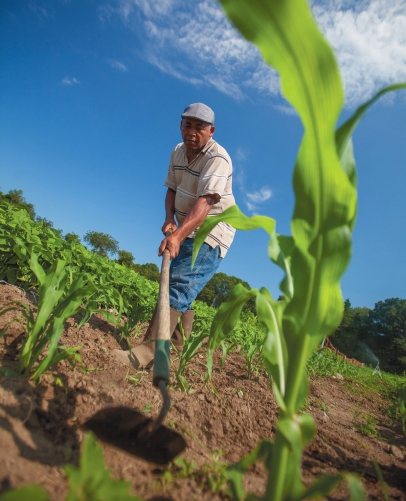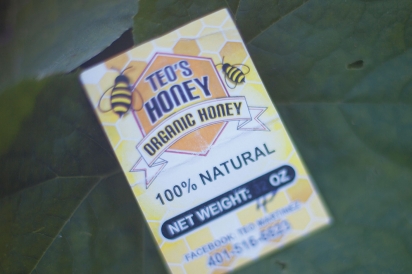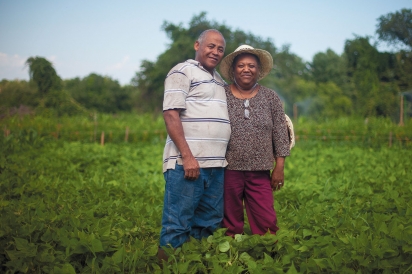Three Ways to Farming with Teodulio Martinez
A Farmer and Beekeeper Tills the Soil in his Native Dominican Republic, in his South Providence Backyard and at Southside Community Land Trust’s Urban Edge Farm
Everyone knows that all farmers experience long, tedious and demanding workdays, but we’ll go out on a limb and speculate that Teodulio (“Teo,” pronounced TAY-oh) Martinez is busier than most: Genial and welcoming, Teo maintains a vibrant urban garden at his South Providence home, a half-acre plot at Southside Community Land Trust’s (SCLT) Urban Edge Farm in Cranston and a farm in his native Dominican Republic (the DR)!
Teo and his wife, Margarita, invite me into their cozy home to share their story. My rudimentary Spanish was virtually worthless, so Alyssa Rooks, then a SCLT program associate and AmeriCorps VISTA volunteer, fluent in Spanish, translated, although Margarita, a long-time U.S. resident from the DR, speaks far more English than I do Spanish.
Margarita met Teo through his brother in the DR. As a pastor in the DR and newly married to Margarita, Teo actually dreamt about coming to the United States; that dream—one widely shared by many around the world—came true in December 2014 when he was 55. Teo acclimated quickly to life in Rhode Island, thanks to having connections to local pastors, locating land to farm and finding a source for beehives. Their relationship with one another and Teo’s with Rhode Island grew all the sweeter after he discovered a beehive outside of a building where he was working temporarily; with the building owner’s permission, Teo harvested 70 pounds of honey from the hive!
Farming is in Teo’s blood. “Since I started walking, I started planting,” he tells Alyssa. As a youth, he lived for several years with his godfather, who had a 30-acre farm. There, they planted cacao beans, yautia, coffee, avocados and oranges and cared for livestock. Later, he returned to Santa Domingo, the capital city of the DR, where he attended Bible school, fished and looked after someone’s cattle.
His South Providence urban farm is a cornucopia of joyful abundance, and proof of not merely Teo’s green thumb, but his 10 green fingers. Onion, garlic, cucumber, radish, lettuce, beets, beans, cabbage, peppers, cilantro, celery, Swiss chard, tomatoes, grapes and strawberries are planted in his front yard’s raised beds; a pear tree grows nearby. He says that he grows what he likes to eat; the produce is for his family’s consumption and is also sold at Sankofa World Market farmers market on Elmwood Avenue, which runs Wednesday afternoons, from 2–6 pm, from early June through late October.
Behind their home, Teo shows me the beehives as well as his outdoor kitchen’s wood-fired oven that he is building—in which he will prepare a meal for Providence Mayor Jorge Elorza when it’s complete.
“I am making a little piece of the DR here,” says Teo. “I do everything here that I did in the DR; I plant what I eat.”
He praises both the United States and SCLT. Calling the DR a “disaster” where no one else is grafting trees to improve the stock, he says, “In the United States, you help the good and punish the bad.” Of his connection to SCLT, he recalls that someone from SCLT had walked past his home and, after seeing his garden, offered him free seeds.
Thrilled by the seeds, Teo says, “I took one of everything and I thought of my country … and brought some seeds to send back to my family.” He’s learned so much from SCLT about plant diseases, soil care and avoiding pesticides. “In the DR, we burn branches and leaves, but here we use them for compost,” he says. Also, farmers in the DR use a lot of chemicals to kill pests, but here, thanks to SCLT, Teo began growing tobacco, bitter leaves and hot peppers which, mixed together with soap, make an organic pesticide. He returns frequently to his island home to plant crops on his farm, where someone else harvests and sells Teo’s crops for him.
And, the relationships he’s developed are significant, too. Although he’s not worked yet with other farmers, Teo says, “We’ve … met people who … help. We’ve been able to sell and smile together. We’ve gotten to know Ben [Torpey, a farmer at Scratch Farm].”
With 35 years of beekeeping experience, Teo, with Margarita’s translation help, peruses the Rhode Island Beekeepers Association’s Facebook page and responds to questions and offers advice. Believing that great gardeners help, serve and think about others, Teo hopes to take what he’s learned here through SCLT and bring that expertise back to farmers in the DR. Margarita says that Teo would like to teach other Spanish-speaking people about beekeeping and agriculture; SCLT needs a program for such individuals, she says.
As I listen to Teo, Margarita and Alyssa volley questions and answers back and forth, I don’t need to understand Spanish to observe the genuine fondness and mutual admiration they have for one another. Alyssa says that working with them has been so meaningful.
“They’re very generous and loving; it’s been a gift to spend time with them,” says Alyssa. “Teo has great questions and is always working; his mind is always turning.”
Gardening is like school for Teo, a lifelong learner who is always experimenting. In the DR, he grafted five or six different varieties of mango onto a mango tree and he hopes his passion fruit plant in Providence will bear fruit next year.
Teo laughs and then wipes tears from his eyes after I ask him if he gets homesick for his family or for his farm in the DR. He pauses and says, “How did you know? Last night, I told Margarita, ‘I was dreaming of [the DR]. When I’m here, I dream of there; when I’m there, I dream of here.’”
When we visited Teo and Margarita in early June 2017, unseasonably cool and rainy weather had kept Teo, one of several farmers at Urban Edge Farm, from planting there. When he does, his first plantings will be of beans, pumpkin and squash—which he will sell at Sankofa World Market—but he plans to change that up each growing season.
Gracious and hospitable, Teo and Margarita urge me to try his homemade wine, made from his grapes. I decline—it’s only 9:30 am, after all. Food, however, is a different story:
Alyssa; Rob Booz, SCLT’s director of operations; and I all eagerly accept their offers of piping hot, savory pork and yucca empanadas that Teo whipped up while we talked.
“I cook, but Teo knows how to cook,” jokes Margarita. “I cook for 10; he cooks for 100.”
With pages and pages of notes and my belly full of empanadas, I prepare to say adios to Teo and Margarita, but I can’t leave yet. Teo darts into the kitchen and returns, pressing a bottle of his honey, harvested from his beehives, into my hands.







